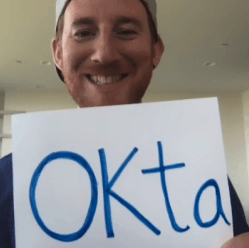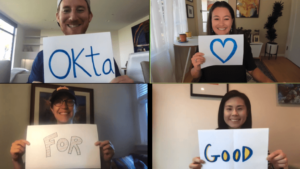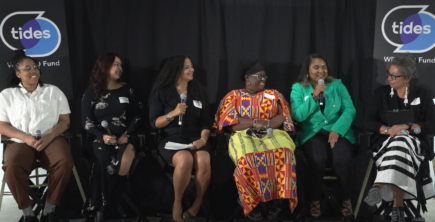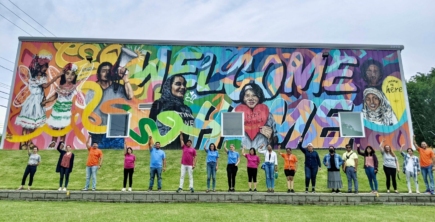
Crisis Response Fund

As all of us grapple with the profound impact of COVID-19 on the entire social change sector, it has become abundantly clear how the sector is ill-prepared for coping with this new reality from a technology standpoint. The sector needs transformational leadership to be better prepared for crises so that remote working arrangements are the norm, data is secured from constant attack, and social impact is consistently delivered in spite of unforeseen disruptions.
Okta, a Tides partner since 2017, is stepping up to provide transformational support and partnership to the social change sector for future crises. At their annual conference on April 2, held entirely virtually this year, Okta announced a $10 million commitment over the next three years to support nonprofits working at the intersection of social good and technology. These grants will be administered through the Okta for Good fund at Tides Foundation. I had a chance to catch up with Erin Baudo Felter, Vice President of Social Impact, to hear her insight on how the company reached this historic decision and their vision for the future. At Tides, we encourage and support our corporate partners to leverage all of their assets for social good. My conversation with Erin reflects how Okta’s integrated approach to corporate social impact is aligned with that philosophy.
Can you share who Okta is? What is the vision of the company for our world?
Okta is a San Francisco-based technology company. Our vision is to enable any organization to use any technology.
As a Pledge 1% company, social impact is not an afterthought but truly built into the company’s DNA. Can you share how that happened and how you and your team ensure social impact is manifested daily throughout the company?
Okta for Good is not a small side project, giving away some money or running some volunteer programs. It’s a fully embedded and critical piece of our business, and celebrated as such across the company.
Giving back has been core to Okta’s culture and championed by our co-founders from the start. In 2016, prior to going public, Okta established our social impact initiative, Okta For Good, with a mission to strengthen the connections between people, technology, and community. Our founders took the 1% Pledge, committing our time, product, and equity to giving back and reserved 300,000 shares of our common stock to support Okta for Good’s work and investments. This commitment has allowed us to support nonprofit organizations in our communities around the world, empower our employees to give back, and accelerate the impact of the nonprofits that rely on Okta every day to make their work more efficient and secure.
Okta has several key elements that have helped make our social impact efforts authentic, successful and sustainable—in fact, they are why I joined Okta three years ago: 1) an authentic commitment from the top; 2) ownership and engagement across our employee base; and 3) strategic alignment between the business and our social impact goals. Okta for Good is not a small side project, giving away some money or running some volunteer programs. It’s a fully embedded and critical piece of our business, and celebrated as such across the company.
Why nonprofit technology and why now? How has the current pandemic changed your view (or not) on the role of Okta for Good in solving social challenges?
We’ve always believed in the power of technology to transform and scale mission-driven organizations. It’s been the north star of our work with Okta for Good since its founding. For years we’ve not only donated and discounted our technology and services for nonprofits ($2.2M in donated tech last year alone), we’ve also leveraged the Okta for Good fund to make philanthropic investments in organizations working at the intersection of tech and social good. For example, Okta was a founding partner of the Center for the Digital Nonprofit—an effort launched by NetHope in 2017 to accelerate the digital transformation of the global nonprofit space.

Okta’s social impact initiative, Okta For Good, was established in 2016. It’s mission: strengthen the connections between people, technology, and community.
Learning has been as much of a focus as giving when it comes to our social impact efforts. One thing that is continuously clear to us is that there is a widening tech gap in the nonprofit sector. For years, these organizations have been struggling to move to the cloud, invest in digital service delivery, hire tech talent, and find the kind of long-term, unrestricted funding needed to invest in technology as a strategic priority. COVID-19 has only accelerated this. The difference is, organizations now have no choice, they must shift to remote work, digital fundraising, and virtual services as they meet the crushing demands in our communities as a result of this crisis.
Last month, we announced that Okta is committing $10M out of the Okta for Good fund over the next three years. The majority of the funds are being channeled through our brand new Nonprofit Technology Initiative, which is laser-focused on supporting the foundational technology need of nonprofits and accelerating this digital transition. COVID-19 has only strengthened our resolve that investing in nonprofit technology is the best way for Okta to use its resources and support its communities.
As you built Okta’s social impact practice, what surprised you? Where did you go for support and answers?
I’ve been in this field for nearly 15 years and have worked at four very different companies. The first (pleasant!) surprise was how much Okta’s senior leadership “gets it” when it comes to social impact. I took a walk around Okta’s San Francisco neighborhood during my job interview with our CEO Todd McKinnon. It was clear to me from that first conversation that he had a deep understanding and commitment to building social impact as a strategic part of the business and culture. And our co-founder and COO, Frederic Kerrest, who is also my boss, has offered one of the most valuable assets as we’ve built the work: trust. In the past, much of my job was spent justifying to company leaders why the company should give back and focus on social impact in the first place. At Okta, it’s more like: “We know we’re going to do this. We know why it’s important. Now, tell us: how do we make it as strategic and high impact as possible? How do we build smart? How do we grow the vision?”
COVID-19 has only strengthened our resolve that investing in nonprofit technology is the best way for Okta to use its resources and support its communities.
That doesn’t mean it’s been an easy ride. Building a social impact program from the ground up is daunting, but it’s a challenge I’ve loved taking on. I’ve relied heavily on my network of peers who have been generous in sharing information and insights that have shaped our programs. And now that we aren’t in startup mode anymore, I’m trying my best to do the same: sharing advice where I can and taking an active role in Pledge 1%’s leadership group—the Pledge 1% Builders—for the last two years and also engaging with Tides’ Corporate Social Impact Leaders Forum, another valuable community of peers. Tides itself has also been a great source of knowledge and support as we have crafted a philanthropy program with a focus on innovation and collaboration across sectors.
The growth of Okta in the past several years is phenomenal. I imagine that one constant in the company is competing priorities. What advice can you share with your fellow corporate social impact practitioners on the topics of keeping steady the social impact work and accelerating your reach?
There are always competing priorities, especially at a hypergrowth company like Okta. My best advice is to stay visible and over-communicate. Find ways to showcase momentum and growth of your social impact programs, and make your employees and leadership—and broader community—a part of the journey. It’s critical to get into the flow of information and communicate across the same channels as the rest of the business. Ask yourself: what are the primary internal and external channels for our company to share news with the world? What are the biggest stages that we’re on each year? Then try to embed as deeply and regularly as you can.
If I had a corporate social impact magic wand, the first thing I would do would be to create more ways for companies to collaborate so they can support issues together.
For us, that means leveraging Okta’s weekly All Hands meetings, hosted by our cofounders, as a regular platform to share progress and announce new programs, especially for employees. It means fostering an active Slack channel where our employees share their personal passions around giving back—most recently around our Giving Tuesday campaign, called #GivingInPlace. It also means putting a lot of resourcing behind Oktane, our annual customer conference. This has become the place each year where we make major philanthropic or social impact announcements. There is also always an audience engagement piece where Oktane attendees—our customers and partners—can take part in our social impact work, which is an incredible way to build community and showcase our values.
If you had a magic corporate social impact wand, what’s the first thing you’d like to point it at?
Today, there are more companies engaging in philanthropy than ever before. Everyone wants to give back in ways that are smart, strategically aligned to their business, and responsive to community needs. But right now, much of this giving is done independently, rather than collaboratively. The challenges and problems that nonprofits work to solve for and support are huge, and no one company will be able to make a significant impact on their own. In addition, these independent efforts create a tremendous duplication of effort for the nonprofit organizations who feel the burden of engaging with us one by one.
If I had a corporate social impact magic wand, the first thing I would do would be to create more ways for companies to collaborate so they can support issues together. In the Bay Area, Tipping Point’s SFGives initiative around poverty provided a blueprint for how this type of initiative can work locally. And groups like ImpactCloud are proving new models for radical collaboration from the tech sector around nonprofit technology enablement. Moving forward, as funders and nonprofits align with sustainable development goals, we need more opportunities for collective philanthropy across the corporate sector. This is a great place for partners like Tides to play even more of a strategic role.

Crisis Response Fund

WE LEAD

Equality & Human Rights

Read the stories and hear the voices of social change leaders fighting for justice.